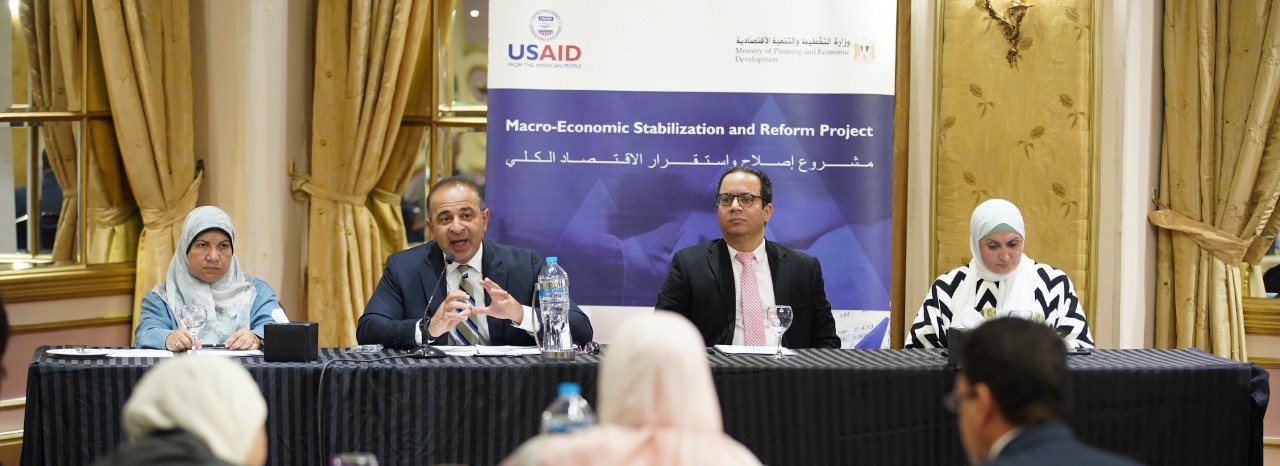Planning Ministry, MESR run a training workshop on the conceptual guide for a gender-responsive sustainable development plan

04 September 2022
The Ministry of Planning and Economic Development, in cooperation with the USAID-funded Macroeconomic Reform and Stability (MESR) project, held a training workshop on the conceptual guide for a gender-responsive sustainable development plan.
The workshop was attended by Dr. Ahmed Kamali, Deputy Minister of Planning and Economic Development, Dr. Jamil Helmy, Assistant Minister for Sustainable Development Follow-up Affairs, Dr. Khaled Barakat, Assistant Professor of Public Administration, Faculty of Economics and Political Science, Cairo University, Dr. Rasha Hakim, Senior Economic Adviser, USAID.
Dr. Ahmed Kamali, Deputy Minister of Planning and Economic Development, stressed the importance of the training topic related to the gender-responsive sustainable development plan guide, pointing out that the Ministry of Planning and Economic Development launched another guide on environmental sustainability standards nearly a year ago.
Kamali explained that work at the Ministry of Planning is based on evidence, measuring what is being accomplished, and following up on what has been accomplished in Egypt.
He further asserted the importance of the process of evaluating the initiatives and projects undertaken by the government and directing them in the right direction.
On the partnership between various government institutions, bodies, and ministries, Kamali explained that there is another dimension of the partnership between the government, international institutions, and academics to achieve SDGs sustainable development goals, referring to the seventeenth goal of the UN Sustainable Development Goals, which deals with the partnership to achieve the sustainable development goals.
Kamali pointed out that the workshop brings together the participation of the government, academics, and the MESR project, which gives impetus to advance the achievement of sustainable development goals, stressing the importance of partnership to combine all the efforts of the government, the private sector, civil society, academics, and all development partners.
Kamali pointed out the importance of training, noting that when the integrated system was launched for the preparation and follow-up of the investment plan, training of all support agencies was started.
Kamali explained that the ministry made a great effort in terms of training, which contributed to the successful launch of the system, and the reliance on it by all agencies, adding that the follow-up part of the system will take place during the current year.
Kamali also referred to the training for development feasibility studies, pointing to the Ministry of Planning's interest in holding intensive training in this field, as the tendency was not to launch projects without the presence of real development studies to study feasibility, return and cost while looking at development feasibility in its various economic, social and environmental dimensions.
Dr. Ahmed Kamali stressed the importance of equality and equal opportunities, as it is not possible to achieve economic justice without equality.
For his part, Dr. Jamil Helmy, Assistant Minister for Sustainable Development Follow-up Affairs, explained that the Ministry of Planning is responsible for distributing government investments in the state's general budget, stressing the importance of meeting the needs of the neediest social groups such as women, children and people with special needs.
Helmy added that the goal of the training workshop is for the participants to understand how to identify projects and activities within the ministry's plan to which they are affiliated, with performance indicators on the percentage of investments directed to gender from the total approved investments.
It is noteworthy that the training workshop witnessed the participation of 34 officials from planning and budget departments and equal opportunities units in 10 ministries and government agencies (Education, Technical Education, Higher Education and Scientific Research, Social Solidarity, Youth and Sports, Health and Population, Manpower, Culture, and the National Council for Women, the National Council for Persons with Disabilities, the National Council for Childhood and Motherhood), in addition to representatives of the qualitative sectors of the Ministry of Planning, with about 14 training hours over two days.









